Event: NIAD-QE University Quality Assurance Forum 2022
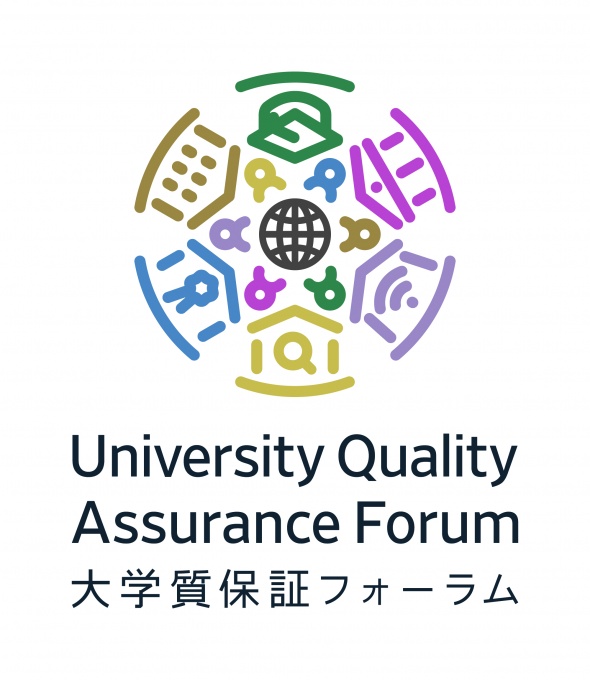
University Quality Assurance Forum 2022
Connecting inside and outside of university:
Toward further integration of learning styles
Wednesday, 28th September 2022
1:30pm - 4:00pm JST (4:30am - 7:00am GMT)
Join ONLINE
Organizer:
National Institution for Academic Degrees and Quality Enhancement of Higher Education (NIAD-QE)
Supporting Organizations:
Asia-Pacific Quality Network (APQN)
Japan Association for College Accreditation (JACA)
Japan Association for Quality of University Education (JAQUE)
Japan Institution for Higher Education Evaluation (JIHEE)
Japan Network of Certified Evaluation and Accreditation Agencies (JNCEAA)
Japan University Accreditation Association (JUAA)
Overview
Constraints in time and space, such as campus, classroom and required years of enrollment have been taken for granted in addressing quality assurance of higher education. Their indisputability, however, is being increasingly challenged by the progress of aging populations and the emerging post-COVID new normal. The role of the higher education sector in promoting lifelong learning is becoming more significant worldwide, and Japan is not an exception. The higher education community has begun to take initiatives in recognizing and incorporating students' work experience, prior learning, and microcredentials acquired on and off campus. These perceived symptoms not only instigate a reconsideration of the role of higher education in society but also require a new insight into its quality assurance.
In 2022, NIAD-QE hosts the University Quality Assurance Forum with distinguished experts from Japan and abroad to have a deeper understanding of the articulation and continuation of learning inside and outside of universities, and to discuss the future of higher education and its quality assurance in Japan.
Agenda & Materials
| 1:30PM | Opening Address |
| 1:35PM | Speech I New Zealand Qualifications Authority [NZQA] |Mana Tohu Mātauranga o Aotearoa Flexible learning: Micro-credentials in Aotearoa New Zealand |
| 2:00PM | Speech II Ex-Director General of Division of Academic Credit Bank System, National Institute for Lifelong Education [NILE], Korea Connecting inside and outside of university: A Case Study of the Korean Academic Credit Bank System and the Bachelor's Degree Examination for Self-Education System |
| 2:25PM | Speech III OPERATIONALISATION OF ACCREDITATION OF PRIOR EXPERIENTIAL LEARNING (APEL) IN MALAYSIA *Assistant Vice President (Open Learning), University of Cyberjaya (UoC) as of November 1st, 2022 |
| 2:50PM | Speech IV Toward Further Integration of Learning Styles: The Open University of Japan's Education System and its Quality Assurance |
| 3:15PM | Break |
| 3:25PM | Panel Discussion Panelist Moderator NODA Ayaka:Associate Professor, Research Department, NIAD-QE |
| 3:55PM | Closing Remarks |
| 4:00PM | End of Forum |
Registration
This forum has ended.
Thank you for your attendance and participation.
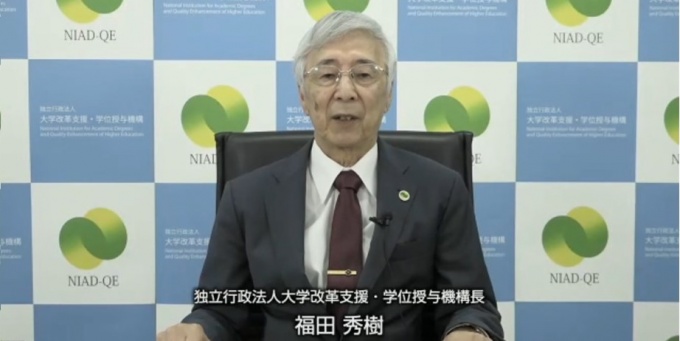
Opening Address
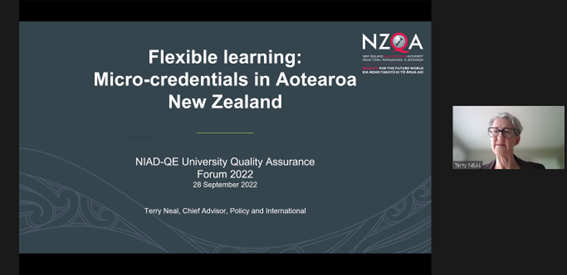
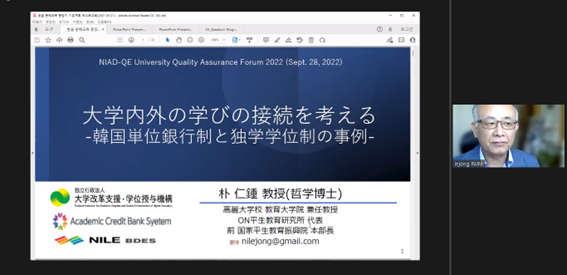
Speech I by Ms. Terry Neal Speech II by Dr. Injong Park
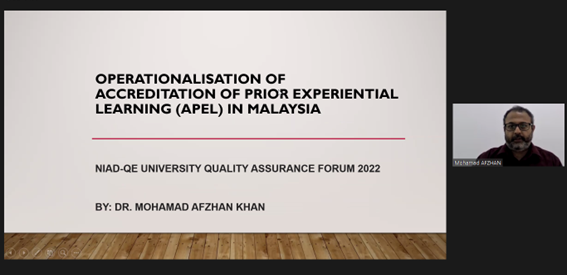
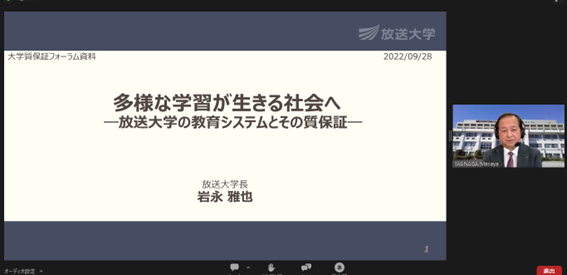
Speech III by Dr. Mohamad Afzhan Khan Speech IV by Dr. IWANAGA Masaya
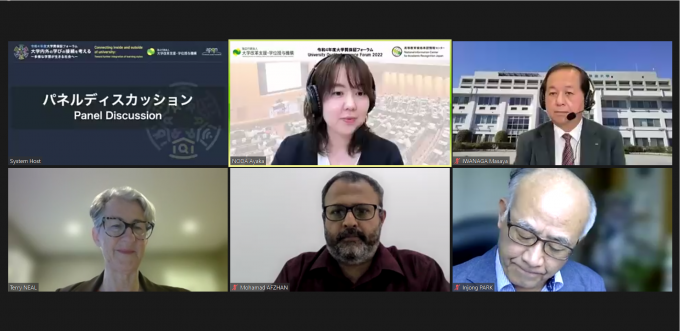
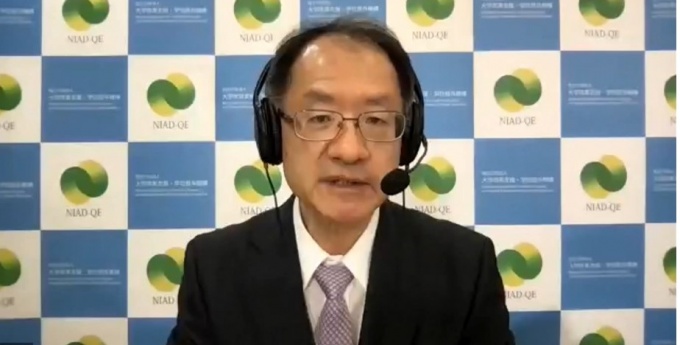
Panel Discussion Closing Remarks
※The recordings have expired.
Report
The NIAD-QE University Quality Assurance Forum 2022 entitled “Connecting inside and outside of university: Toward further integration of learning styles” was held virtually on September 28, 2022, with nearly 400 participants from across Japan and beyond.
FUKUDA Hideki. Ph.D., President of NIAD-QE addressed the opening and an acknowledgement to the supporting organizations and thanked distinguished speakers and all the participants for being present.
The four distinguish speakers, Ms. Terry Neal, Chief Advisor Policy of New Zealand Qualifications Authority (NZQA), Dr. Injong Park, Adjunct Professor at Graduate School of Education, Korea University and Head of the ON Institute of Lifelong Education, Dr. Mohamad Afzhan Khan, Former Director of Accreditation of Prior Experiential Learning (APEL) Centre, Open University Malaysia (OUM), and Prof. IWANAGA Masaya, Ph.D., President of the Open University of Japan (OUJ) then gave their presentations sharing their expertise and experiences.
Ms. Neal delivered a speech on a subject of flexible learning and micro-credentials in New Zealand to kick-off the forum. She introduced NZQA and NZQCF, New Zealand Qualification and Credential Framework, then the theory of micro-credential use in New Zealand, from how it had been formally introduced into the framework and quality assurance system to decrease the skills mismatch between industries and workers and enable people to learn throughout their lifetime, and to how it has been implemented at many workplaces. Ms. Neal highlighted the importance of being responsive to the needs of industries and learners, along with changing society, for scaling up the use of micro-credentials in New Zealand.
Dr. Park introduced National Institute for Lifelong Education (NILE), Korea, and its two major scheme, Academic Credit Bank System (ACBS) and Bachelor’s Degree Examination for Self-Education System (BDES) as Dr. Park himself was one of the founding members of the institute and Ex-director of the ACBS. ACBS recognizes individual learning experiences as credits that can be accumulated towards university equivalent degree. BDES enables people to earn an academic degree through a course-by-course examination with their own study resources. Dr. Park shared the long-term progress of the two systems and their quality control, and emphasized the necessity of promoting such systems that recognize diverse lifelong learnings and an appropriate quality control in order for credentials to be acknowledged positively in the society.
Dr. Afzhan introduced the APEL system which grants qualifications to learners with cumulative learnings and experiences through a course of assessments, and how micro-credential is used in Malaysia to help people upskill which also leads to enhance country’s human resource development capacity. He then pointed out from the university perspective existing and possible challenges on recognizing different styles of learnings. Dr. Afzhan stressed the importance of democratization of education and providing equal accessibility to learners with different barriers to learning by not only providing flexible learning but also advancing APEL system where informal and non-formal learnings are officially recognized.
Prof. Iwanaga presented the overview of OUJ, introducing its education system and how it had changed the major class format over the course of the pandemic, along with the recent implementation of Internet Based Test (IBT). In the light of increasing demand for recurrent education, OUJ is also considering a use of micro-credentials to further foster lifelong learning. While OUJ has challenges to address such as equivalency to other universities’ degrees and qualifications, and to continue facilitating recurrent education, Prof. Iwanaga underscored the importance of such educational reforms to timely respond to a social demand in education and human resource.
Following the four experts’ presentations, moderated by Prof. NODA Ayaka, Associate Professor, Research Department of NIAD-QE, the panel discussion was centered on the topics of social perception of degrees and qualifications earned by flexible and non-traditional learnings outside the universities, how we evaluate those learnings and define the equivalency to conventional academic degrees, and the possible challenges for its process. Questions from the audience were also shared at the discussion, and the speakers exchanged their perspectives sharing more of the educational systems and approaches from each of their countries.
Secretariat
Secretariat for NIAD-QE University Quality Assurance Forum 2022
International Affairs Division, NIAD-QE
![]() +81-42-307-7952
+81-42-307-7952
![]() uqa-forum[a]niad.ac.jp *Please replace [a] with @.
uqa-forum[a]niad.ac.jp *Please replace [a] with @.

